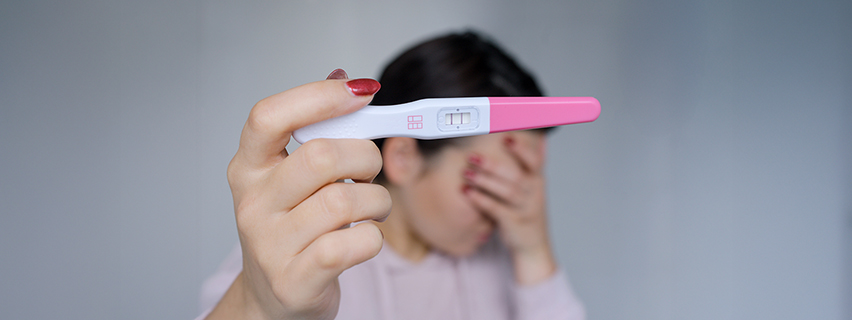What are the Causes of False Positive Pregnancy Test
Taking a pregnancy test can be one of the most emotionally charged moments in a woman’s life. For someone hoping to conceive, those two pink lines often bring overwhelming joy. However, for someone not planning a pregnancy, they may cause anxiety or even panic. That’s why accuracy in results is so important. Home pregnancy kits are designed to be simple, reliable, and highly sensitive to detect pregnancy early. Yet, like any medical tool, they are not foolproof. One of the most confusing scenarios is when the test shows a positive result, but the woman later finds out she is not actually pregnant; this is what we call a false positive pregnancy test.
While less common than false negatives, false positives can cause significant emotional distress and confusion. Many wonder about what causes a false positive pregnancy test and whether it’s something to be concerned about.
What is actually a False Positive Pregnancy Test?
A false positive pregnancy test occurs when a test indicates that a woman is pregnant, but she is not. Home pregnancy tests work by detecting the hormone human chorionic gonadotropin (hCG) in the urine. This hormone is typically produced after a fertilized egg attaches to the uterine lining, and its presence usually signifies pregnancy.
However, there are cases where the test picks up hCG even though the woman is not pregnant, or where other factors interfere with the test’s accuracy. This can lead to a misleading “positive” result, causing unnecessary stress and confusion.
It’s important to distinguish between a false positive and a false negative. A false negative happens when the test fails to detect pregnancy even though the woman is actually pregnant. Interestingly, people often wonder if conditions like carrying twins can cause a false negative pregnancy test. The truth is, twins usually raise hCG levels higher, making tests more likely to detect pregnancy, not less.
What Causes a False Positive Pregnancy Test?
Chemical Pregnancy
A chemical pregnancy occurs when a fertilized egg implants in the uterus but fails to develop properly. In the very early stages, the body may start producing hCG, enough for a pregnancy kit to detect it. However, the pregnancy ends before it can progress further. Because the hCG is still present briefly, the test may show positive even though the woman is not carrying a viable pregnancy.
Recent Miscarriage or Abortion
After a miscarriage or an abortion, hCG levels don’t immediately drop to zero. It can take several days or even weeks for the hormone to leave the body completely. If a pregnancy test is taken during this period, it may still detect residual hCG, leading to a false positive result.
Medications Containing hCG
Certain fertility treatments and medications contain hCG as part of the therapy. If a woman is undergoing fertility treatments and takes a pregnancy kit test, it may pick up the artificially introduced hCG in the body, showing a positive result even if pregnancy has not occurred.
Medical Conditions
Some rare medical conditions, like ovarian cysts, certain cancers like trophoblastic tumours, or disorders affecting the pituitary gland, can lead to elevated hCG levels in the body. While uncommon, these conditions may cause a test to appear positive despite no pregnancy.
User Error
Misreading the test is one of the simplest yet surprisingly common reasons. Evaporation lines that form when the urine dries can sometimes be mistaken for faint positive lines. Apart from that, not following the instructions carefully, like reading the result outside the recommended time window, can also result in a misinterpretation.
Defective or Expired Pregnancy Kit
All medical devices have a shelf life, and pregnancy kits are no exception. Using an expired or faulty kit can cause incorrect readings. Thus, it becomes important to check the packaging and expiration date before taking a test.
Rare Physiological Causes
In some very rare cases, false positives may occur due to the presence of heterophile antibodies, antibodies in the blood that can interfere with hCG measurement. Though uncommon, they are a recognized cause of test errors.
Also Read – Pregnancy Tests and Medications: How They Can Affect Results
What are the Chances of a False Positive Pregnancy Test?

When considering accuracy, pregnancy kits are generally very reliable, with most boasting an accuracy rate of over 99% when used correctly after a missed period. However, false positives do happen, though they are far less common than false negatives.
The chances of a false positive pregnancy test are estimated to be relatively low, often less than 1%. In most situations, if a test shows positive, it is more likely accurate than not. That said, as explained earlier, conditions like chemical pregnancies, residual hCG after miscarriage, or medication use can make false positives more likely.
Another factor is the sensitivity of the test itself. Some tests are highly sensitive and can detect even trace amounts of hCG. While this is useful for early detection, it can also increase the risk of detecting hCG linked to a chemical pregnancy or other non-viable causes.
For anyone facing a negative pregnancy test scenario, where one test shows positive and another shows negative, it’s best to consult a doctor for confirmation. Blood tests and ultrasounds provide more reliable answers than at-home kits.
A false positive pregnancy test can be deeply unsettling, particularly when emotions and expectations are involved. While rare, they do occur for various reasons, including chemical pregnancies, residual hCG after miscarriage or abortion, fertility medications, medical conditions, and even test errors.
Understanding what causes a false positive pregnancy test can help reduce confusion and offer a clearer perspective when results don’t match reality. While home tests are designed to be accurate and accessible, they are not substitutes for professional medical advice.
If you find yourself with conflicting results or suspect the test may not be accurate, it’s always wise to follow up with a healthcare provider. They may suggest a blood test, repeat testing after a few days, or an ultrasound for confirmation. Being informed and cautious helps ensure peace of mind.
Frequently Asked Questions
Q. Can twins cause a false negative pregnancy test?
Twins generally increase hCG levels, making it easier to detect pregnancy. They do not usually cause a false negative. False negatives are more often related to testing too early or diluted urine samples.
Q. What should I do if I get a positive result but then a negative one?
This could indicate a chemical pregnancy or simply a test error. In such cases, it’s best to repeat the test after a couple of days or visit a doctor for a more accurate blood test.
Q. How many days after a miscarriage can I trust a pregnancy test result?
It may take several days to weeks for hCG levels to return to normal after a miscarriage. Waiting at least two weeks before retesting can help avoid false positives.
Q. Can medical conditions mimic pregnancy in a test result?
Yes, some medical conditions can mimic pregnancy in a test result; however, the chances are very rare. Conditions like ovarian cysts or certain tumours can produce hCG, leading to misleading test results.
Q. Are expired pregnancy kits reliable?
No, expired pregnancy kits are not reliable. Expired kits may not work as intended and can easily give false positives or false negatives. Always check the expiry date before use.













































Leave a comment